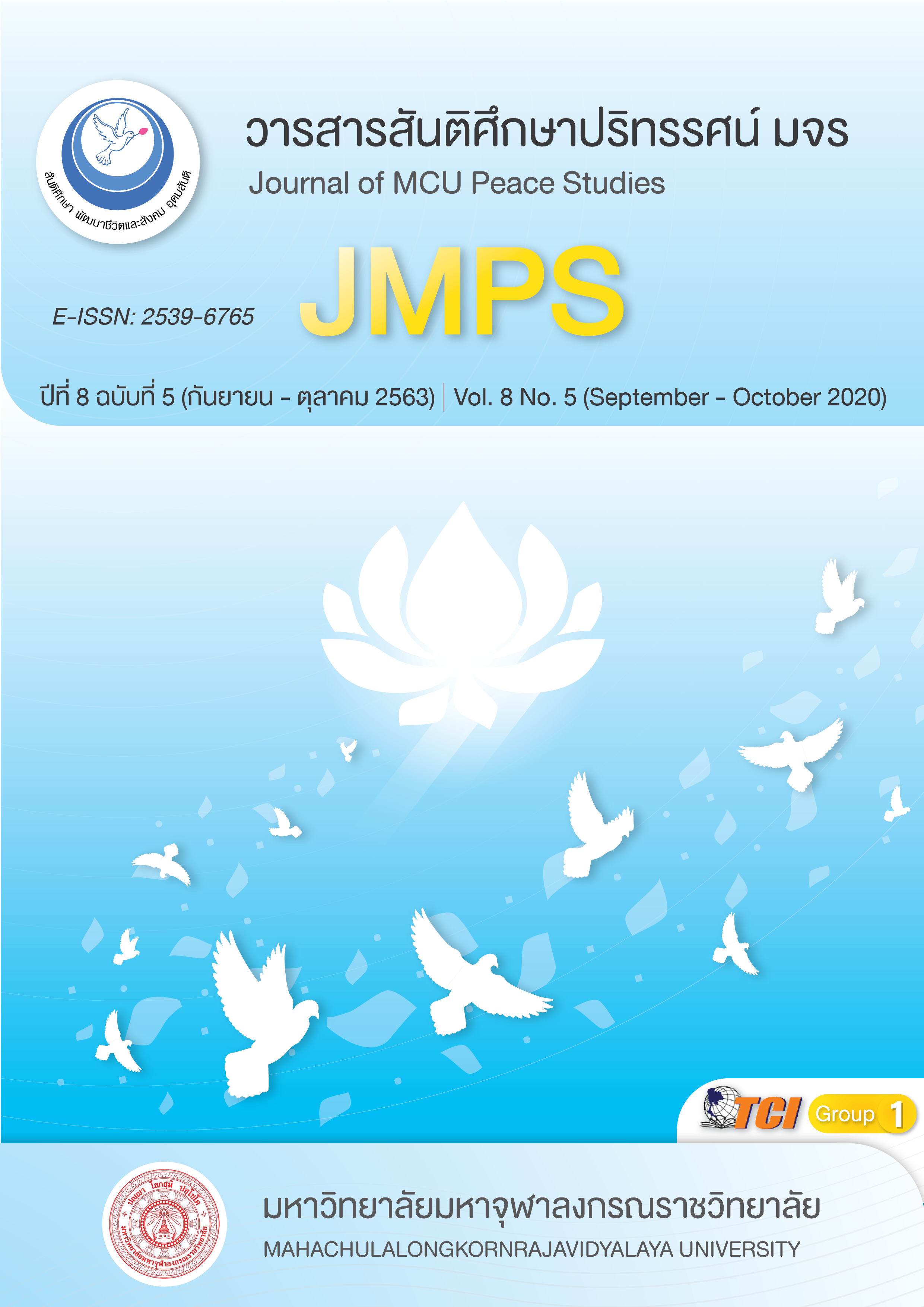54 ผู้นำหมู่บ้านต้นแบบเศรษฐกิจพอเพียง กับทัศนคติในการก้าวพ้นความยากจนสู่ระดับความพอเพียง : สะบายดีอีสาน
Main Article Content
บทคัดย่อ
บทความวิจัยเพื่อศึกษาทัศนคติต่อการมีหลักธรรมาภิบาลในการพัฒนาหมู่บ้าน การมีส่วนร่วมในกิจกรรมการพัฒนาพื้นที่ รวมถึงทัศนคติเกี่ยวกับเศรษฐกิจพอเพียง และศาสตร์พระราชาที่ทำให้ทุกคนก้าวพ้นความยากจนได้ เก็บข้อมูลด้วยแบบสอบถามและแบบสัมภาษณ์กับผู้นำ 54 หมู่บ้านต้นแบบเศรษฐกิจพอเพียงใน 5 จังหวัด ได้แก่ อุดรธานี หนองบัวลำภู หนองคาย บึงกาฬและเลย ผลการวิจัยพบว่า ผู้นำส่วนใหญ่ที่มีอาชีพภาคเกษตร มีทัศนคติต่อหลักธรรมาภิบาลความโปร่งใสมากที่สุดในการทำงานพัฒนาในชุมชน รวมทั้งการให้ความร่วมมือกับหน่วยงานภาครัฐ โดยให้แนวทาง งบประมาณ จำนวนคน ระยะเวลา ผลที่เกิดขึ้นได้ ส่วนการมีส่วนร่วมรับผลประโยชน์ในการจัดสรรทรัพยากรของชุมชนตามความเหมาะสมและเป็นประชาธิปไตยมีระดับมากที่สุด ทั้งนี้ผู้นำมีส่วนร่วมในกิจกรรมการพัฒนาพื้นที่ในด้านการร่วมคิดค้นหาปัญหา นำเสนอโครงการ กิจกรรมการพัฒนาหมู่บ้านต่อส่วนรวมมากที่สุด ทัศนคติด้านเศรฐกิจพอเพียงและศาสตร์พระราชาควรรู้จักการปลูกผักสวนครัว ลดอบายมุข ประกอบอาชีพที่สุจริต และยังมีกลุ่มสัจจะออมทรัพย์ ศูนย์เศรษฐกิจพอเพียงในชุมชน เจ้าหน้าที่มาพัฒนาให้ความรู้ ธนาคารขยะ ป่าชุมชน รวมทั้งการช่วยเหลือคนยากจน นอกจากนี้ ยังพบอีกว่าหมู่บ้านต้นแบบเศรษฐกิจพอเพียงต้องยึดหลักประชาธิปไตย มีความเชื่อมั่นในหลักปรัชญาของเศรษฐกิจพอเพียง ทุกคนรักและช่วยเหลือกันตลอด สร้างอาชีพเสริมแบบรวมกลุ่ม การแลกเปลี่ยนเรียนรู้การเลี้ยงสัตว์ การใช้ภูมิปัญญาท้องถิ่นและมีกลุ่มพิทักษ์ป่า รูปแบบที่นำพาประชาชนพ้นจากความยากจนคือ สร้างความ เชื่อมั่นในตัวผู้นำที่เสียสละเวลามาทำงานให้กับหมู่บ้านท้องถิ่น จนเกิดคำว่า “ผู้นำทำก่อนจึงทำตาม เพราะเชื่อมั่นคนทำที่สำเร็จ”
Article Details
ทัศนะและความคิดเห็นที่ปรากฏในบทความในวารสาร ถือเป็นความรับผิดชอบของผู้เขียนบทความนั้น และไม่ถือเป็นทัศนะและความรับผิดชอบของกองบรรณาธิการ ยินยอมว่าบทความเป็นลิขสิทธิ์ของวารสาร
เอกสารอ้างอิง
Bhumibol Adulyadej, His Majesty King. (2009). The Guidance of His Majesty the King: The Royal guidance and Speeches on Sufficiency Economy. (8th ed.). Bangkok: Bangkok Printing.
Buasai, L. (2006). Sufficiency Economy. Learn how to network. Bangkok: Amarin Printing and Publishing.
Chitsuchon, S. (2013). Research report proposed by the Office of the National Economic and Social Development Board. Bangkok: Thailand Development Research Institute.
Cohen, J. & Uphoff, N. (1980). Participation's place in rural development: Seeking clarity through specificity. World Development.
Community Development Department. (2014). Leader and Extension of the Sufficiency Economy Village by Community Capital. Bangkok: Department of Community Development.
Office of the National Economic and Social Development Board (NESDB). (2011). His Majesty the King Working Principles. Bangkok: Prechrung printing Center.
Office of the National Economic and Social Development Board (NESDB). (2016). Poverty Analysis and Inequality Analysis in Thailand 2015. Bangkok: Office of the National Economic and Social Development Board.
Phukamchanoad, P. (2009). The Participation of Community Committee in Sub-community Development in Dusit District, Bangkok. Bangkok: Suan Sunandha Rajabhat University.
Phukamchanoad, P. (2016). Guidelines for Social Network Development towards Environmental Conservation and Ways of People’ Lives at Floating Market for Sustainable Tourism in Taling-Chan District, Bangkok. Bangkok: Suan Sunandha Rajabhat University.
Phukamchanoad, P. (2017). Social Development of Happiness Based on Philosophy of Sufficiency Economy affected to Paddy Field and Rock Salt Field with Participation of The Baan Dung District, Udon Thani Province, Thailand. Bangkok: Suan Sunandha Rajabhat University.
Phukamchanoad, P. (2018). Citizen Participation in Community Development Management for the Social Inequality Mitigation in the Three Poor Cities from the Northern Zone Based on the Sufficiency Economy Philosophy. Bangkok: Suan Sunandha Rajabhat University.
Phukamchanoad, P., Pungnirund, B., & Paisan, K. (2019). Antecedents Affecting the Quality of Life of Families Residing in the Sufficiency Economy Philosophy Model Villages. Research and Development Journal Suan Sunandha Rajabhat University, 11(2), 1-15.
Poonlab, S. (2011). Social Capital and Self-Independence Based on the Sufficient Economy Philosophy of the Minority Group in Mhok Jam Royal Project. (Doctoral Dissertation). Suan Sunandha Rajabhat University. Bangkok.
Silpcharu, S. (2006). Research and Analyze Statistical Data by SPSS. (5th ed.). Bangkok: V. inter print.
Siriprachai, S., Wisawesuan, N., & Srisuchart, S. (2004). Macroeconomic Policy and Poverty in Thailand. Knowledge Status Survey in Thammasat Economics Journal, (22)3.
Sufficiency Economy Steering Committee Office of the National Economic and Social Development Board. (2007). Application of sufficiency economy principles. Bangkok: (n.p.).
The Chaipattana Foundation. (2014). Sufficiency Economy and The New Theory. Bangkok: Amarin Printing & Publishing.


